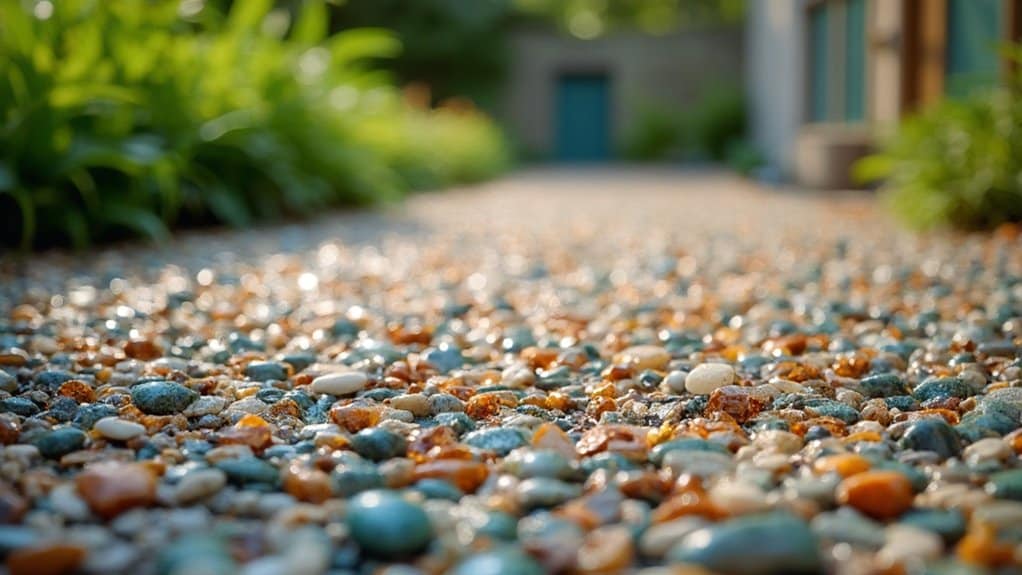Modern resin-bound gravel technology offers British property owners remarkable advances in durability and environmental benefits. Advanced resin formulas now withstand typical UK weather conditions whilst providing excellent drainage – crucial for our rainy climate. The surfaces handle everything from daily foot traffic to parked vehicles without cracking, perfect for British driveways and garden paths. Installation times have been cut dramatically, meaning less disruption to your property. Today's colour ranges complement traditional British architecture, from Yorkshire stone hues to contemporary slate greys. These permeable surfaces meet strict planning requirements for sustainable drainage, helping reduce local flood risks. The technology continues to evolve, making resin-bound gravel an increasingly practical choice for British outdoor spaces.
Key Takeaways
Top Innovations in Resin-Bound Gravel Systems
- Modern resin blends now last 15+ years with basic upkeep, standing up brilliantly to British weather – from harsh winters to scorching summers.
- Green manufacturing right here in the UK uses recycled materials, cutting carbon output whilst delivering top-quality surfaces.
- Stunning design choices available – mix and match colours and stones to create anything from a subtle driveway to a striking garden path with personal touches.
- Clever drainage solutions mean no more puddles or waterlogging – particularly useful for British properties prone to heavy rainfall.
- Installation's now a doddle with pre-measured kits and specialist tools, meaning faster, more reliable results for installers and homeowners alike.
Advanced Resin Technology for Enhanced Durability
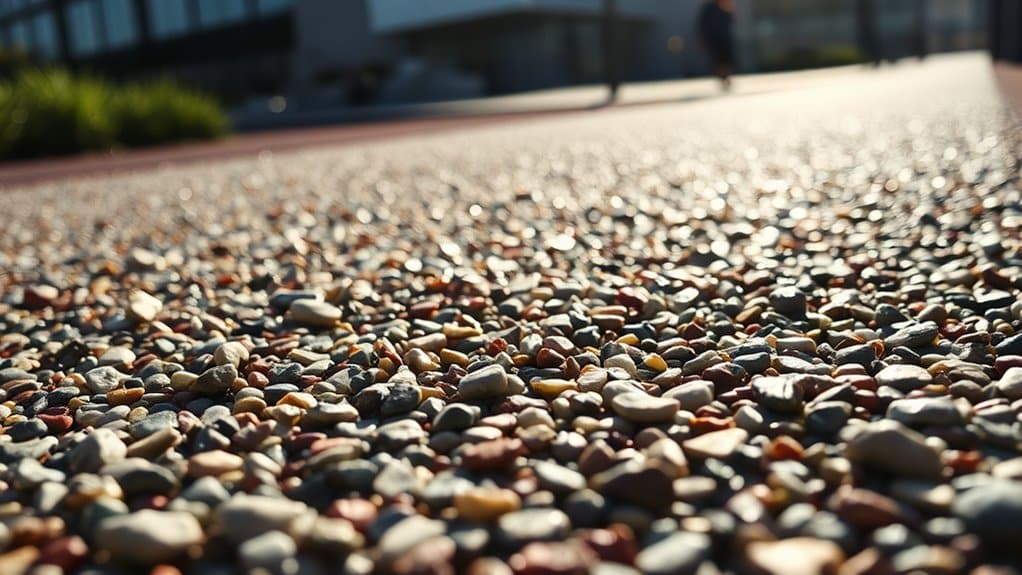
Advanced resin technology has transformed the durability of resin-bound surfaces like driveways and pathways. Modern polymers and composites significantly boost strength, making these surfaces ideal for both foot traffic and vehicles. Tests show excellent resistance to British weather, including frost and rain, whilst maintaining structural integrity. The use of engineered plastics in resin formulations enhances the long-term performance of these surfaces against environmental stressors.
Additionally, resin surfacing solutions can last over 15 years with proper maintenance, making them a reliable choice for homeowners. The smooth, weed-resistant finish looks smart and requires minimal maintenance. UV protection keeps colours vibrant, whether you opt for traditional grey or contemporary earth tones. Built-in slip resistance makes these surfaces particularly suitable for British weather conditions, offering safety in both wet and dry conditions.
For UK homeowners and developers, resin-bound surfaces prove especially practical. They withstand everything from summer heat to winter frost, making them a solid investment for driveways, garden paths and public spaces.
Their combination of durability and aesthetic appeal makes them increasingly popular across British residential and commercial projects.
Eco-Friendly Resin Formulations
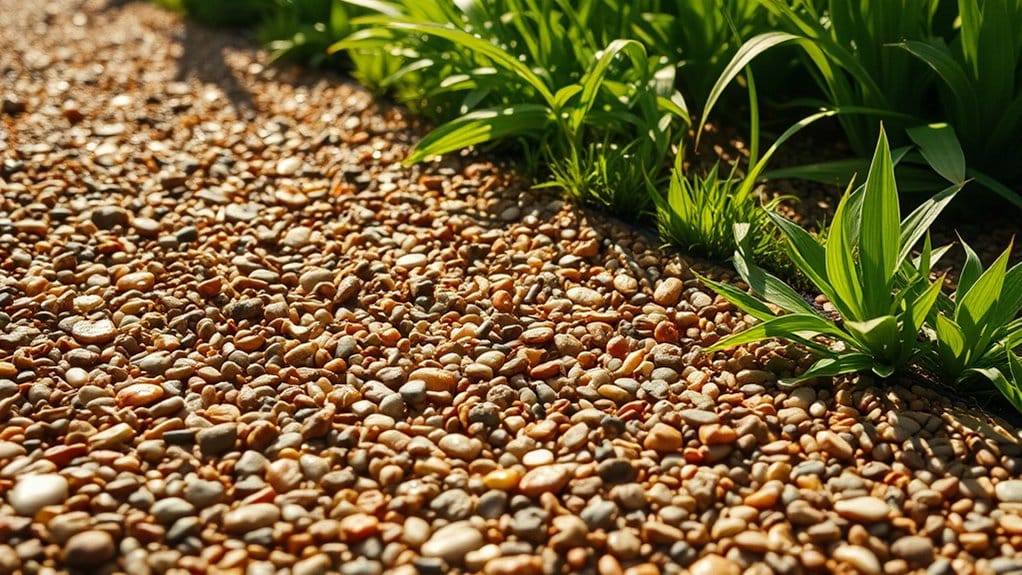
Eco-Friendly Resin Formulations
Sustainable resin formulations rely heavily on eco-friendly materials to cut carbon emissions. Incorporating recycled plastics boosts both performance and environmental benefits, creating a practical solution for the UK market. This method ensures your projects meet green standards whilst delivering reliable, long-lasting results. The approach works particularly well in British manufacturing, where recycled materials from local sources can be integrated into existing production lines. Think of it like using reclaimed timber in furniture making – it's both resourceful and environmentally sound. Additionally, using ARC (Acrylic Resin Composite) as an eco-friendly casting resin exemplifies how innovative materials can enhance sustainability in production. Furthermore, leveraging permeable paving solutions not only manages stormwater effectively but also contributes to the overall eco-friendliness of construction projects.
Sustainable Material Integration
Eco-friendly resin blends mark a key step forward in sustainable materials, balancing environmental care with solid performance. These formulations use responsibly sourced ingredients, often featuring biodegradable elements that break down naturally over time. UV-stable aliphatic resins ensure colours stay true and last longer – particularly useful for garden furniture and outdoor decking. They cope well with Britain's damp weather and won't crack during temperature swings. When mixed with recycled materials like Smart Gravel, these resins help cut waste whilst improving insulation. Think of it like using reconstituted bottles in road surfaces – it's practical and environmentally sound. This approach delivers the durability builders need whilst meeting growing demands for greener building materials in the UK construction sector. Additionally, the integration of 10X insulation performance in these materials enhances energy efficiency, making them even more attractive to environmentally-conscious builders. The whole system works rather like a jigsaw, with each sustainable element fitting together to create better, more planet-friendly materials that actually work in real-world conditions. Furthermore, these eco-friendly resins contribute to permeability rates that facilitate effective water drainage, reflecting their utility in urban water management.
Reduced Carbon Emissions
Modern eco-friendly resin systems offer significantly lower carbon emissions compared to traditional options.
These new formulations work brilliantly with S.U.D.S. guidelines, which are crucial for UK drainage management. The porous nature of these surfaces lets rainwater soak through naturally, much like your garden lawn, helping prevent flooding whilst reducing environmental impact.
These resins are tough stuff – they resist chemicals and UV damage, meaning they last far longer than conventional materials. You won't need to replace them as often, which saves both money and carbon emissions in the long run.
Think of it like choosing a quality kettle that lasts for years instead of replacing a cheap one every few months.
For British homeowners and builders looking to make environmentally sound choices, these eco-friendly resins strike the right balance between practical performance and environmental care.
They're particularly well-suited to our wet climate, where effective drainage is essential.
Recycled Plastic Utilization
Recycled plastics in resin mixtures offer both environmental benefits and sound business sense. Using post-consumer (PCR) and post-industrial (PIR) materials cuts costs whilst conserving valuable resources.
These mixtures perform just as well as new materials, especially when combined with recycled fillers and additives. Common applications include everything from drinks bottles to industrial parts.
The recycled resins work brilliantly in packaging, where UK manufacturers increasingly favour sustainable options. Many British firms now choose these materials to meet their green targets and support the wider push towards a circular economy.
The process is straightforward: recycled plastics are sorted, cleaned and processed into new resins that match traditional quality standards.
This practical approach helps UK businesses reduce their environmental impact whilst maintaining product performance.
Customization Options for Aesthetic Appeal
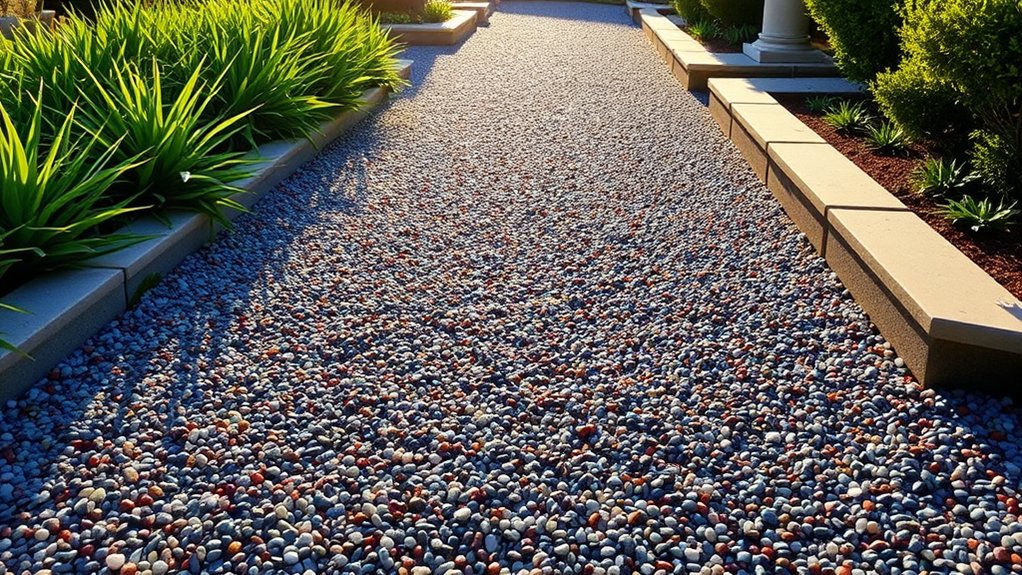
Transform your outdoor spaces with resin-bound gravel's versatile design options. This innovative surface treatment offers a range of customisation choices, from natural earth tones to bold colours that complement your property's character.
Create eye-catching patterns by mixing different coloured aggregates, or use contrasting shades to mark out distinct areas and borders.
Whether you fancy geometric patterns or natural swirls, the design possibilities are extensive. Add your personal stamp with bespoke motifs or company logos, whilst various textures – from crushed glass to smooth river pebbles – provide both style and practicality.
Metal trim or brick edging perfectly finishes the look, helping your outdoor space blend seamlessly with its surroundings.
For instance, a grey-toned aggregate might suit a modern home's driveway, whilst warm honey colours could enhance a cottage garden path.
The choice of finish and colour combinations allows you to craft exactly the look you're after, making your outdoor space truly unique.
Improved Surface Permeability
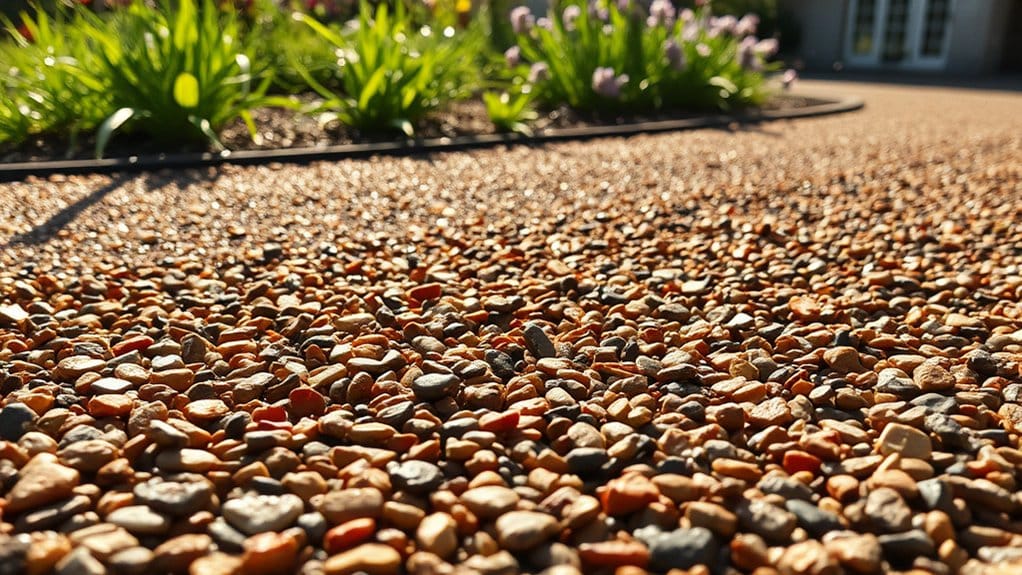
Urban areas across the UK face growing issues with water management, but resin-bound gravel offers a practical answer. These surfaces let rainwater drain naturally through them, cutting down on surface water and flood risks that many British towns face.
The system works by allowing water to soak through to the ground below, helping maintain local water tables and keeping soil healthy. It meets Sustainable Urban Drainage Systems (SUDS) standards, which means less strain on local drainage networks – particularly helpful during our wet winters.
Thanks to its porous base layer, installing resin-bound surfaces is straightforward, and often doesn't need planning permission.
Think of it like a giant sponge: water passes through instead of pooling on top or overwhelming street drains. It's a smart solution that tackles both current drainage problems and supports future environmental needs.
Impact Resistance and Longevity
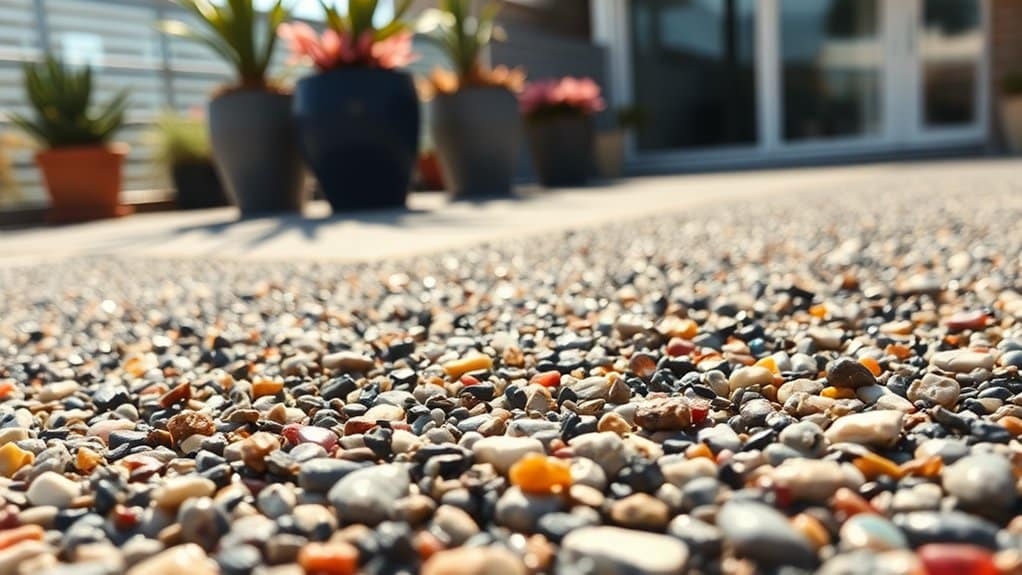
Resin-bound gravel offers excellent impact resistance and lasting durability.
The sturdy surface handles heavy loads well, making it perfect for driveways, car parks and busy pathways.
Quality resins combined with carefully selected stones create a tough surface that maintains its appearance and strength for years – even under regular vehicle traffic and harsh weather conditions.
Enhanced Surface Durability
The durability of resin-bound gravel depends largely on its impact resistance and longevity, which are essential for a reliable installation. Proper materials and surface treatment play vital roles in achieving lasting results.
| Factor | Impact on Durability |
|---|---|
| Aggregate Choice | Reduces surface breakdown |
| Resin Formulation | Improves impact absorption |
| Substrate Preparation | Guarantees strong bonding |
| Adhesion Strength | Prevents cracking |
| Maintenance Practices | Extends overall lifespan |
Think of it like building a strong foundation for a house – each element must work together. The right aggregate, similar to choosing quality bricks, prevents the surface from wearing down under daily use. Meanwhile, proper resin formulation acts like shock absorbers, protecting against impacts from vehicles and foot traffic. Regular maintenance, such as occasional brushing and cleaning, keeps the surface in top condition, much like caring for a garden patio.
Heavy Load Resistance
Heavy load resistance is vital for long-lasting resin-bound gravel surfaces. The strength of your base material directly affects how well the surface handles weight.
While standard resin driveways work fine for cars and small vans, larger vehicles need a stronger foundation. For these, you'll want a properly thick base with steel mesh reinforcement.
Polyurethane resin performs better than epoxy when it comes to flexibility, which means less cracking under pressure.
The key is getting the groundwork right – your subbase must be properly compacted to spread weight evenly across the surface.
For best results, particularly with commercial projects or areas expecting heavy vehicles, it's worth getting a professional assessment to ensure you're using the right materials for your needs.
Long-Lasting Performance
Resin-bound gravel delivers outstanding durability compared to traditional surface materials. Its robust structure handles heavy use whilst maintaining excellent drainage, preventing those bothersome puddles common to British weather.
The smooth, seamless finish helps avoid cracking, and UV-stable components keep colours looking fresh, much like a well-maintained garden fence. It's particularly suited to our changeable climate, standing up to both winter frost and summer heat without breaking down.
Getting it fitted properly is key – a professional installation ensures your surface will cope with everything from weekend garden parties to heavy rain.
You can choose between epoxy or polyurethane resins, rather like picking the right paint for your house, to match your specific needs. For a long-term outdoor surface that'll handle British weather year after year, resin-bound gravel is a solid choice.
Sustainable and Recycled Materials
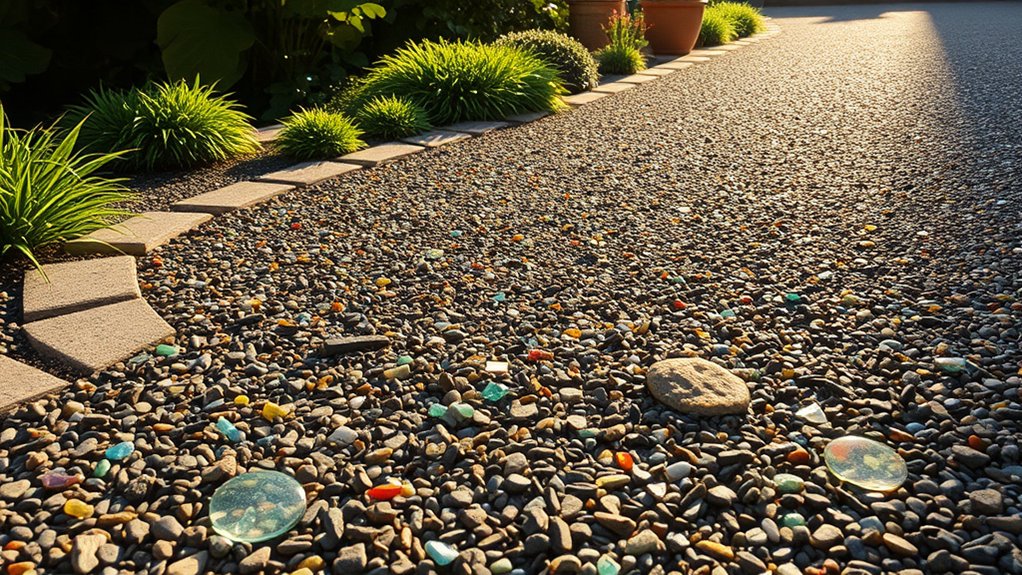
Sustainable and recycled materials are leading the way in resin-bound gravel technology across the UK, offering a green solution for eco-friendly construction. These materials support environmental balance whilst reducing the carbon footprint of each installation.
| Feature | Benefit | Impact |
|---|---|---|
| Permeability | Stops water pooling | Meets UK SUDS requirements |
| Recyclable Resins | Better end-of-life options | Less waste to landfill |
| Natural Aggregates | UK-sourced materials | Fewer transport miles |
| Waste Plastic Utilisation | Tackles plastic waste | Makes surfaces stronger |
Like many British innovations in construction, these developments boost lasting performance whilst keeping maintenance simple. A typical driveway using these materials might need just an occasional sweep and pressure wash, saving time and protecting the environment.
Streamlined Installation Processes
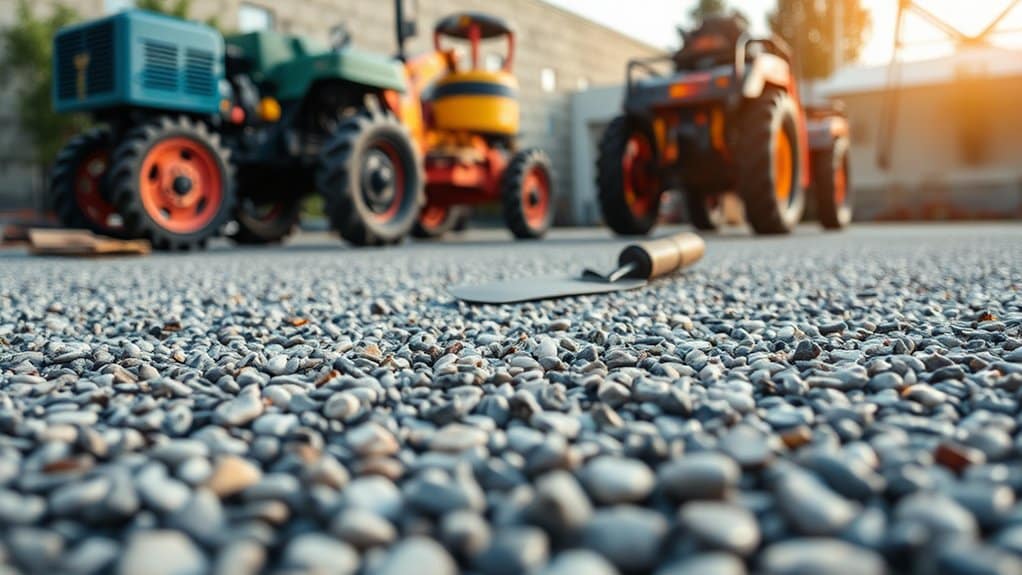
Streamlined installation methods transform resin-bound gravel laying, making the entire process simpler and more efficient.
Fast-track techniques cut project times whilst still allowing workers to make vital adjustments on-site – much like fitting a kitchen worktop, where precision meets practicality.
The process delivers both speed and quality, similar to how modern paint systems allow decorators to achieve professional results in fewer coats.
Simplified Installation Techniques
The rise in resin-bound gravel's popularity has led to simpler installation methods, benefiting both trade professionals and keen DIYers across the UK. Modern techniques address common fitting challenges whilst reducing the learning curve for newcomers.
Essential improvements include:
- Ready-measured kits that take the guesswork out of mixing
- Superior priming methods for better surface grip
- Professional-grade tools like squeegees for smooth spreading
- Better drainage designs to prevent water pooling
| Feature | Benefit |
|---|---|
| Pre-Measured Kits | Simplifies mixing |
| Enhanced Priming Techniques | Improves adhesion |
| Efficient Mixing Tools | Saves time and guarantees consistency |
| Innovative Drainage Solutions | Increases durability |
Much like fitting a kitchen worktop, these straightforward methods help achieve professional results without specialist training. The improvements make installation more manageable whilst delivering better-quality surfaces that last longer.
Time-Efficient Procedures
Time-saving methods have made resin-bound gravel installation far more straightforward in recent years. Proper prep work is essential – thoroughly sweep and pressure wash the base to ensure it's spotless.
Check the weather forecast, as you'll want a dry day for the best results. A simple grid system helps you apply the right amount of mixture across the surface, much like marking out a patio before laying slabs.
Use a forced-action mixer (like the ones you'd see on building sites) and measure your resin precisely – getting this wrong can be costly. Modern spreading tools, similar to large squeegees, help you work quickly across the surface.
Level everything carefully, just as you'd when screeding concrete. Mind your curing times and keep the surface at the right moisture level while it sets.
Think of it like watching paint dry – you wouldn't want anyone walking on it too soon. Good planning makes all the difference, especially when working with British weather.
On-Site Adjustments
On-Site Adjustments
Getting resin-bound gravel right requires smart on-site decisions. The key adjustments ensure a proper installation whilst saving time and effort:
- Base Preparation: Check the surface is solid and dig to proper depth – typically 15-20cm for driveways, 10cm for paths.
- Weather Watch: Work in dry conditions between 5-25°C. Skip rainy days or scorching afternoons common in British summers.
- Right Tools: Match mixers and trowels to your job size – forced action mixers for larger areas, hand mixers for small patches.
- Quality Checks: Keep a close eye on your mix ratios. Think porridge consistency – not too wet, not too dry.
These practical checks help sort problems quickly, much like checking your spirit level before laying a patio.
A thorough approach now prevents costly fixes later.
Low Maintenance and Easy Care
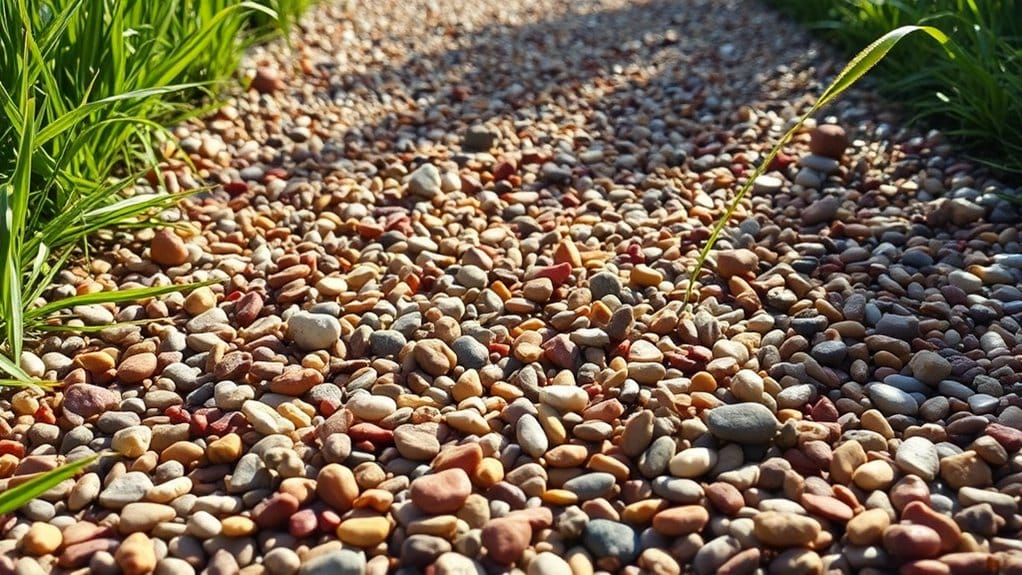
Resin-bound gravel stands out as one of the most hassle-free surfaces you can choose for your property. A quick sweep or blast with the pressure washer is all it takes to keep it looking smart.
Unlike traditional gravel that shifts about or concrete that often cracks, this surface stays put and lasts over 20 years when fitted properly.
The surface naturally drains rainwater, so you won't have to deal with puddles after a typical British downpour. Think of it like a solid sponge – water simply soaks through rather than pooling on top.
The tough resin binding means stones stay firmly in place, even under heavy foot traffic or car wheels.
Simply put, if you're after a durable surface that won't eat into your weekend with constant upkeep, resin-bound gravel ticks all the boxes.
It's particularly brilliant for driveways and garden paths where you want something that looks good without the faff of regular maintenance.
Diverse Color and Texture Combinations
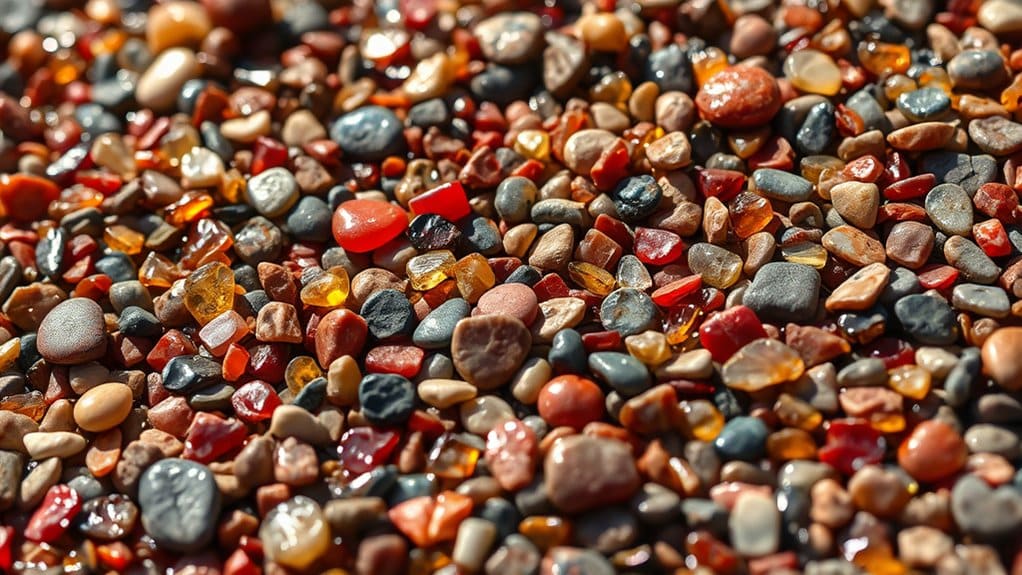
Resin-bound gravel comes in a vast array of colours and textures, perfect for enhancing any UK property.
These practical options let you create eye-catching surfaces that match your design vision:
- Colour Range: Pick from classic British shades like warm honey, slate grey, or subtle rose pink to match your home's character.
- Mixed Finishes: Blend different stones to create unique looks – particularly useful for matching period properties or modern builds.
- Surface Feel: Choose from smooth river pebbles to angular granite chips, each offering different grip levels ideal for our varied weather.
- Pattern Work: Use contrasting colours to create smart borders or feature designs, brilliant for setting your driveway apart from the neighbours'.
These combinations work brilliantly to tie your outdoor space together, whether you're updating a Victorian terrace or a new-build home.
Future Trends in Resin Technology
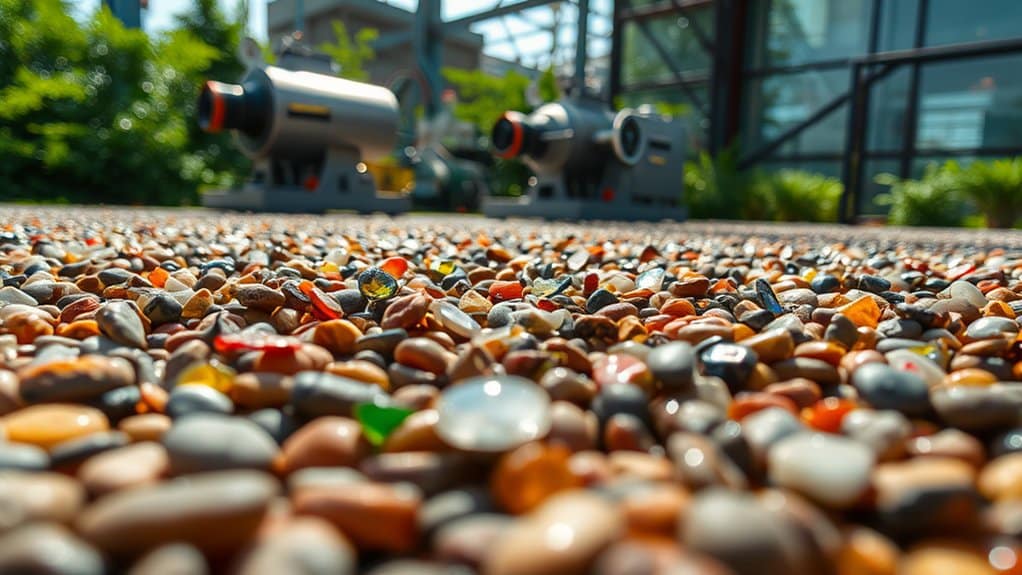
Advances in resin technology are set to transform UK industries in the coming years. Smart materials that respond to their environment will become commonplace, improving everything from building materials to medical equipment. These resins will combine with nanotechnology to create stronger, more versatile products.
In healthcare, new bioactive resins are emerging that can help wounds heal and fight off infections – particularly useful in NHS medical devices. The market is shifting strongly towards environmentally friendly options, matching British consumers' growing demand for sustainable materials.
Modern manufacturing methods, paired with digital technology, are making resin production more precise and efficient. These improvements will benefit key UK sectors, from aerospace to automotive manufacturing, changing how we develop and use materials across the board.
The changes are particularly relevant for British manufacturers and developers who need to meet stricter environmental regulations whilst maintaining high performance standards. These new resins offer practical solutions to both challenges.
Frequently Asked Questions
How Does Resin-Bound Gravel Compare to Traditional Paving Materials?
Resin-bound gravel stands out from traditional paving with its smart looks and versatile design options. The system gets laid faster than standard block paving or concrete, though you'll need qualified fitters to do the job properly. It's particularly suited to British driveways and garden paths, where its permeable surface helps manage our frequent rainfall.
Can Resin-Bound Surfaces Be Repaired if Damaged?
Resin-bound surfaces can indeed be repaired when damaged. A skilled contractor can fix most issues by applying matching resin and aggregate to damaged areas, much like filling a pothole in tarmac. Whilst small repairs are straightforward, larger damage may require professional attention to ensure the colour and texture match perfectly. Regular maintenance and swift attention to any cracks or chips will keep your surface looking smart and prevent more serious problems down the line.
What Is the Typical Lifespan of Resin-Bound Gravel?
Resin-bound gravel, when properly installed and maintained, typically lasts upwards of 25 years. Think of it like a well-built garden path – its durability depends on quality materials and proper installation in suitable weather conditions. Regular sweeping and occasional pressure washing help maintain its appearance and extend its life.
Are There Any Weight Restrictions for Vehicles on Resin Surfaces?
Resin surfaces typically handle regular cars and vans without any problems. However, for heavy goods vehicles or industrial machinery, you'll need a properly reinforced base. A standard resin driveway suits most domestic vehicles up to 7.5 tonnes, whilst commercial applications might require additional structural support. Always check with your installer about specific weight limits for your project.
How Do Weather Conditions Affect Resin-Bound Surface Performance?
Weather conditions play a vital role in how resin-bound surfaces perform. Temperatures below 5°C can slow down curing, whilst summer heat above 30°C may cause the resin to set too quickly. Much like how British weather can be unpredictable, these surfaces need proper conditions to work well. Avoid laying during heavy rain or when ground frost is likely, as excess moisture prevents proper bonding. Think of it as painting your garden fence – you wouldn't do it on a rainy day if you want the best results.
Conclusion
Recent advances in resin-bound gravel surfaces have transformed British driveways and garden paths. This modern technology combines durability with visual appeal, offering a practical alternative to traditional loose gravel or concrete. The permeable surface helps manage rainfall effectively—particularly useful for the UK climate—whilst maintaining a smart, well-kept appearance. Available in various colours and finishes, from classic Cotswold stone to contemporary granite blends, resin-bound surfaces prove that practical doesn't mean boring. Perfect for both residential drives and commercial spaces, this innovative surfacing option delivers the longevity British homeowners expect from their outdoor investments.
